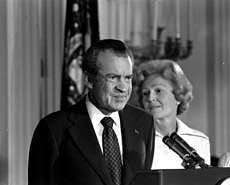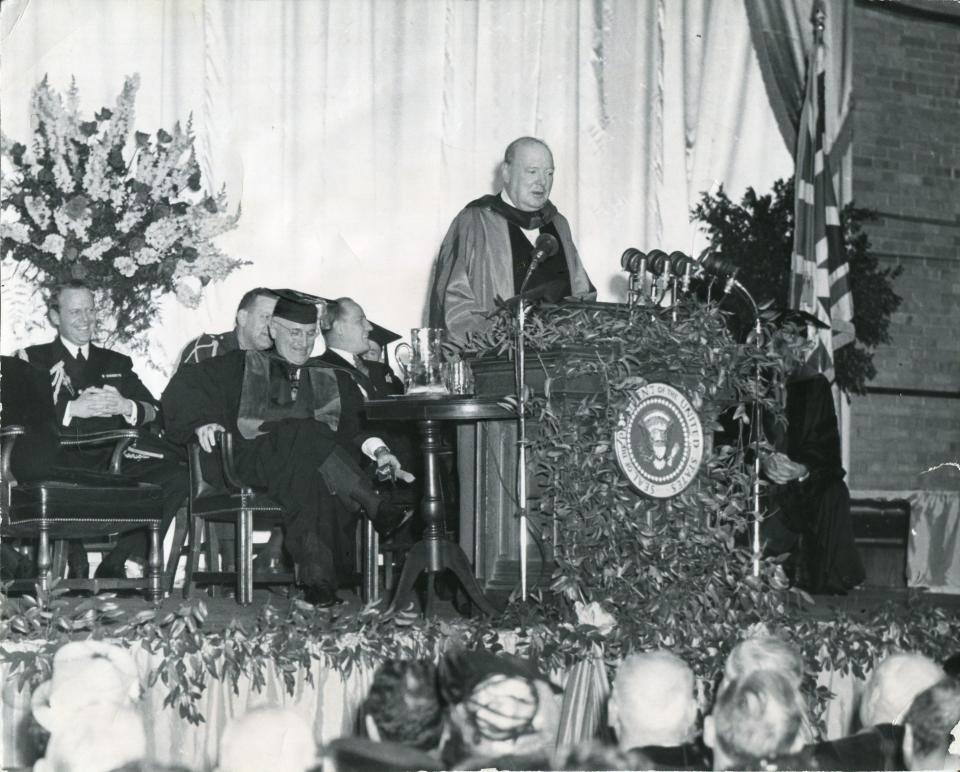The Week in History, Nov. 6-12
- Oops!Something went wrong.Please try again later.
- Oops!Something went wrong.Please try again later.
- Oops!Something went wrong.Please try again later.
- Oops!Something went wrong.Please try again later.
- Oops!Something went wrong.Please try again later.
- Oops!Something went wrong.Please try again later.
Nov. 6
1861: Confederate President Jefferson Davis was elected to a six-year term of office.
1934: Nebraska voters approved dissolving their two-chamber legislature in favor of a nonpartisan, single (or ''unicameral'') legislative body, which was implemented in 1937.
1947: ''Meet the Press'' made its debut on NBC; the first guest was James A. Farley, former postmaster general and former Democratic National Committee Chair; the host was the show's co-creator, Martha Rountree.
1956: President Dwight D. Eisenhower won re-election, defeating Democrat Adlai E. Stevenson.
1962: Democrat Edward M. Kennedy was elected senator from Massachusetts.
1993: One thousand student musicians from around South Dakota were at Northern State for the 40th annual All State Orchestra and Chorus. Every high school, public and private, was represented at the event.
Nov. 7
1811: U.S. forces led by Indiana Territory Gov. William Henry Harrison defeated warriors from Tecumseh's Confederacy in the Battle of Tippecanoe.
1962: Republican Richard Nixon, having lost California's gubernatorial race, held what he called his ''last press conference,'' telling reporters, ''You won't have Nixon to kick around anymore.''

1972: President Richard Nixon was re-elected in a landslide over Democrat George McGovern of South Dakota.
1980: Actor Steve McQueen died in Ciudad Juarez, Chihuahua, Mexico, at age 50.
1988: Stephanie Herseth, a senior at Groton High School, received the school's Good Citizen Award from the Daughters of the American Revolution. She advanced to the state competition.
1993: Presentation College inaugurated its new president, Alexander Popovic, and dedicated its new student center.
2018: Former major league baseball player Darryl Strawberry was the keynote speaker for the Aspire Foundation dinner and fundraiser at the Dakota Event Center.
Nov. 8
1889: Montana became the 41st state.
1923: Adolf Hitler launched his first attempt at seizing power in Germany with a failed coup in Munich that came to be known as the ''Beer-Hall Putsch.''
1960: Massachusetts Sen. John F. Kennedy defeated Vice President Richard M. Nixon for the presidency.
1972: The premium cable TV network HBO (Home Box Office) made its debut with a showing of the movie ''Sometimes a Great Notion.''
1988: Vice President George H.W. Bush won the presidential election, defeating Massachusetts Gov. Michael Dukakis.
2007: President George Bush suffered the first veto override of his seven-year-old presidency as the Senate enacted, 79-14, a $23 billion water resources bill despite his protest that it was filled with unnecessary projects.
2016: Donald Trump was elected president of the United States, defeating Hillary Clinton.
Nov. 9
1938: Nazis looted and burned synagogues as well as Jewish-owned stores and houses in Germany and Austria in a pogrom that became known as ''Kristallnacht.''
1953: Welsh author-poet Dylan Thomas died in New York at age 39.
1961: The Beatles' future manager, Brian Epstein, first saw the group perform at The Cavern Club in Liverpool, England.
1965: The great Northeast blackout occurred as a series of power failures lasting up to 13 hours left 30 million people in seven states and part of Canada without electricity.
1976: The U.N. General Assembly approved resolutions condemning apartheid in South Africa, including one characterizing the white-ruled government as ''illegitimate.''
2002: President George W. Bush said in his Saturday radio address that Saddam Hussein faced a final test to surrender weapons of mass destruction.
Nov. 10
1775: The U.S. Marines were organized under authority of the Continental Congress.

1942: British Prime Minister Winston Churchill, discussing the recent victory over Rommel at El Alamein, Egypt, said "Now this is not the end. It is not even the beginning of the end. But it is, perhaps, the end of the beginning."
1972: Fire destroyed Aberdeen's five-story Safeguard Industries building. The fire started in the company's paint room and quickly spread throughout the massive structure, which ultimately collapsed just three hours after the fire was discovered.
1974: In the recent elections, Democrat James Abourezk defeated Republican Robert Hirsch to claim the U.S. Senate seat vacated by presidential candidate George McGovern. Democrat Frank Denholm was re-elected to the 1st District House seat by defeating John Vickerman while the state's 2nd District House seat went to Republican James Abdnor who defeated Patrick McKeever.
1974: Don Reshetar, head football coach at Aberdeen Central, announced his retirement from that position.
2009: John Allen Muhammad, mastermind of the 2002 sniper attacks that killed 10 in the Washington, D.C. region, was executed.
Nov. 11
1918: Fighting in World War I came to an end with the signing of an armistice between the Allies and Germany.
1974: Beadle Floral (formerly Koch's Flowershop) at 904 S. Eighth St. hosted its grand opening. Jim Beadle leased the business from O.H. Koch, who was retiring.
1977: The annual Sadie Hawkins dance was held at the Aberdeen YMCA. Opus provided music for the dance.
1981: Brown County's 14 Vietnam War casualties were honored when the new Vietnam War Memorial in Anderson Park was dedicated. The ceremony included the sounding of a 21-gun salute and a “missing man” formation fly over by members of the South Dakota Air National Guard.
1981: Stephanie Herseth scored 10 points to help the Groton girls' basketball team defeat Clark 62-37.
1987: Following the failure of two Supreme Court nominations, President Ronald Reagan announced his choice of Judge Anthony M. Kennedy, who went on to win confirmation.
Nov. 12
1927: Josef Stalin became the undisputed ruler of the Soviet Union as Leon Trotsky was expelled from the Communist Party.
1942: The World War II naval Battle of Guadalcanal began. (The Allies ended up winning a major victory over Japanese forces.)
1977: Women's fashion store Maurice's opened at Third Avenue and Main Street.
1982: Yuri V. Andropov was elected to succeed the late Leonid I. Brezhnev as general secretary of the Soviet Communist Party's Central Committee.
1987: The American Medical Association issued a policy statement saying it was unethical for a doctor to refuse to treat someone solely because that person had AIDS or was HIV-positive.
This article originally appeared on Aberdeen News: The Week in History, Nov. 6-12

